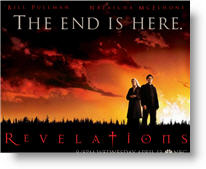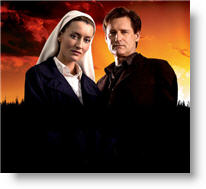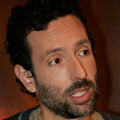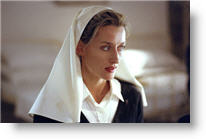Personal interview with Creator/Writer David Seltzer and Executive Producer Gavin Polone about their “Revelations” (2005) mini-series
by Chris Monroe
Staff Writer

The end is here.
The first episode in the “Revelations” mini-series aired on NBC, Wednesday, April 13, 2005.

Also see our REVIEW of “Revelations” Episode 1
Even before the final shooting of the new NBC six hour event series fantasy/drama “Revelations,” I had the opportunity to sit down with creator/writer David Seltzer and producer Gavin Polone and discuss the intentions and inspirations behind this television production. As a show that delves so directly and deeply into the Bible, Christianity, and faith (as well as current events, science and history), it was nearly unavoidable to probe into the beliefs and ideas of those responsible for making it. Don’t expect this series to be very biblically accurate, but as a piece of mainstream media, the reported goals for this drama are perhaps a little more positive than one might initially expect.

David Seltzer
Creator/writer David Seltzer told us how this project got underway and what helped initiate this story:
It started with a call from Gavin Polone. He thought it was time—given the state of the world and what we’re hearing and seeing around us—to deal with the subject in the book of Revelation; about the possible collapse of everything in the end of days. I had done the “The Omen” years ago and often been asked to exercise that piece of my knowledge of creative muscle, and I agreed with him. I thought it really was a good time to do it, simply because the news that we take our morning coffee with really makes us realize that anything can happen.
And not only that, all of the things that signal the Bible in regards to the end of days really looks like it’s in place; not just the constant war and bloodshed, but famine and plague and the fouling of the environment; technically the collapse of everything physically, socially, and politically; the distress of nations, the turbulence of the ocean roaring. We are all seeing it right now.
And for those people who are watching science, who are also somewhat versed in the Bible, definitely see a connection.
Since this piece deals with such a direct reference to the Bible, I asked David Seltzer, as the creator and writer, about his background in regards to faith. He politely explained that he didn’t wish to talk about that aspect. He said:
You know, I know that that’s a great curiosity with people, but it’s my feeling that people are going to react very personally to this, and the way we worship is, I mean, the way any of us speaks to a higher power, is the most personal thing in the world, I think. And if you’ll forgive me, I don’t mean to be coy, but what I do as a writer is to be all characters who believe all things.
So what I am in the confines of my own life is not really important. I’m dealing with faith; I’m dealing with doubt. I’m writing a man; I’m writing a woman. I’m writing a child; I’m writing an old person. I am not all of those things. So, if you’ll forgive me, and I appreciate the question, I’d rather not deal with my own personal faith.
In a UPI news article by Pat Nason (March 21, 2005), Seltzer said “‘Revelations’ would not cover the same ground as the “Left Behind” books have—tribulation, followed by the rapture. We are in no way following a fundamentalist track.”

Gavin Polone
Producer Gavin Polone, on the other hand—while not disclosing his personal beliefs—did share more openly about Christianity and his association with people of faith. When asked about what reaction they expect from religious people in regards to this show, he said:
After we finished the pilot. I showed it to friends of mine who are deeply religious and Christian, and wanted to make sure that they felt comfortable with it. And what I got back from them uniformly, amongst everyone that I showed it to, was a certain gratitude for expressing faith in a specific sectarian manner.
Relevant questions and answersIs Satan a real person that influences our world today? Is he affecting you? Answer
What is a revelation? Answer
What is a Revelation of Christ? Answer
What is “apocalypse”? Answer
What is the Millennium? Answer
Is the Bible truth or tabloid? Answer
How do we know the Bible is true? Answer
When we say that the Bible is the Word of God, does that imply that it is completely accurate, or does it contain insignificant inaccuracies in details of history and science? Answer
How can the Bible be infallible if it is written by fallible humans? Answer
Read the Book of Revelation
I think that the fact that the religion in this show is so clearly Christian, and that we are talking about the New Testament—and willing to take that somewhat sectarian stance—is something that was embraced by everyone that I showed it to. I think people wanted to see some specificity in faith as they see it on the television.
In a 2005 New York Times article (March 20, 2005), Mr. Polone said that “his personal interest in religion and Armageddon stems from a long-ago summer spent at an evangelical Christian youth camp, where he was encouraged to read Hal Lindsey’s apocalypse-themed treatise The Late, Great Planet Earth. “It scared the hell out of me,” he said.”
Polone was asked if the intention of the characters in “Revelations” was to forestall the end of days. He answered:
I don’t think that’s really possible, but I think what’s fun in the show is to have a character who believes that that’s possible. We don’t want to give away what’s going to happen, but the idea of having a skeptic, someone who really starts off as an atheist, and then is just bombarded with evidence that becomes undeniable. Having another character who believes through whatever thinking and research that she has done that it is possible to forestall the conflict, and then looking back in history and saying this is where it has happened a few times, is also a very interesting thing.
But I think that it’s not as though we’re setting it up that our characters are correct about what they’re thinking. Clearly, Professor Massee isn’t correct about what he’s thinking; he starts off saying this is all a lot of hooey. And there’s no way he can deny it by the end of the first episode. Without telling you what’s happening, you get the point of view that we have, and I don’t think that anyone is going to feel alienated by the decision that we ultimately make.
As a piece of mainstream media that deals with faith, it was expected that a question regarding the influence of “The Passion of the Christ” would be asked. When questioned about it, Polone answered, but this topic also seemed to strike another chord with him regarding how he sees the entertainment industry.
They gave us the green light before “The Passion of the Christ,” actually, so it didn’t have an impact over whether they were going to go forward on it. I think it was really the quality of David’s script that pushed it forward, ultimately.
But obviously. I have said for many years that one of the many problems of the entertainment industry is that it’s a very insular world. A lot of people who made the decision are very similar to everyone else in the business, but not necessarily similar from a cultural point of view to the rest of the people in the world, and certainly in America. And the fact that Mel Gibson—one of the most, if not the most, successful people in the entertainment industry living today—had to go and use his own money to make a movie that would have such broad-based appeal (as opposed to having studios fight with each other to get it) really shows that they were not necessarily (in the past) in tune with where the market place was. And he was.
And so, I think it only helps to have evidence from a monetary point of view (because that’s really what rules the entertainment business.), and to show that they were wrong, in a sense, about where the audience is when it comes to faith-based entertainment. And have them turn around and think, “Oh, we can do better if we were to acknowledge this, and begin to understand our audience a little better”—is only beneficial when you’re trying to do something different.
For David and myself, I’m only looking to doing things that are not similar to what’s on television today. So, for me, having to start thinking about other areas, allowed me to go forward and say, here’s a show where there’s nobody carrying a badge or a gun and asking questions about a crime—and we should go forward with something like that.
There are no prominent characters in this who are police officers, lawyers or doctors. And that’s unusual on television today. So I think “The Passion of the Christ” helps in a large way.
Interestingly, Polone also mentioned how he has tried to develop more Christian programs in the past. He says:
I had actually tried to develop something that did have more of a Christian point of view. And when I say that, I mean just the element of having a character say “Jesus Christ” on screen is something you almost never see in television or movies. It doesn’t come up because of this feeling like you’re going to offend the audience somehow. And so I’d tried in different other ways, with doing movies and television.of trying to push something forward that would be different and would speak to the faith that is held by most of the people in our country.

Having seen the first show of this event series myself, I was curious about a line delivered by the character of Sister Josepha Montifiore (Natacsha McElhone), a devout-believer character in the show. In the first episode she makes a reference about “humanity doing their part” which carried a kind of hopeful note in it. When I asked David Seltzer what this meant, here is what he said:
“The Dead Sea Scrolls were hidden away two thousand plus years ago because people at that time believed that the end of days was at hand. And they found every reason to believe that the confrontation between good and evil was going to be final and was imminent. For some reason, it wasn’t.
And, not just the character who I invented, but there are people who believe that someone managed to forestall that day. I think the time has come, the time has been at hand many times in history of the last two thousand years, and I think it’s closer now than it’s ever been.
But all of us know that there are peace conferences. Men can decide to continue to war or men can decide to find peace. So what would happen if peace came? It is hard to imagine, but it’s not impossible. If peace came, we would no longer feel we are at the end of days, because peace would be the beginning of cooperation and sharing the problems of the globe with each other.
So when she says, “I believe there’s an opportunity for man to forestall the end of days,” I think we’re talking about what we all hope will happen. Is there inevitably going to be an end of days? That’s a mystery that only the Bible itself holds. But we all hope that it’s not now, and that we do have some control over it.”
Without knowing how the series itself will end, the discussions with these men helped give a good idea as to what some of their hopes are in creating this kind of entertainment. Considering all of the topics and relevancy of the issues, it will be interesting to see the reactions and discussions that ensue.
NBC entertainment president Kevin Reilly said in an interview, “Ultimately, this is a fictional thriller.”
See our REVIEW of “Revelations” Episode 1